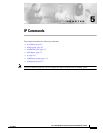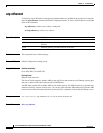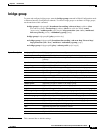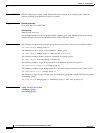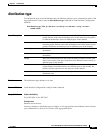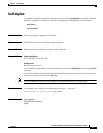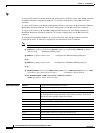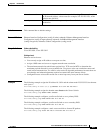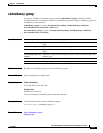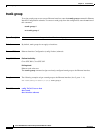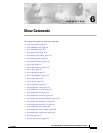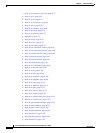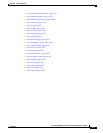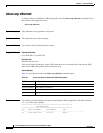
5-9
Cisco SFS 7000 Series Product Family Command Reference Guide
OL-9163-02
Chapter 5 IP Commands
ip
Defaults This command has no default settings.
Command Modes Ethernet Interface Configuration (config-if-ether) submode, Ethernet Management Interface
Configuration (config-if-mgmt-ethernet) submode, InfiniBand Management Interface
(config-if-mgmt-ib) submode, Global Configuration (config) mode.
Usage Guidelines
Platform Availability:
Cisco SFS 3001, Cisco SFS 3012
Privilege Level:
Ethernet read-write user.
• You can only assign an IP address to one port at a time.
• Assign a DNS name and servers to support network name resolution.
• The maximum transmission unit dictates payload size. TCP uses the MTU to determine the
maximum payload allowed for every transmission. Too great a value can overwhelm routers and
result in data retransmission. Too small a value results in degraded performance because there are
more headers and acknowledgements required to transmit the same amount of data.
• ConfigureIP routes to hosts that reside one or more hops away from your Server Switch.
Examples The following example assigns the IP address 10.3.0.24 and the subnet mask 255.255.255.0 to ethernet
card 4 port 1:
SFS-7000P(config-if-ether-4/1)# ip address 10.3.0.24 255.255.255.0
The following example assigns the domain name shasta to the Server Switch:
SFS-7000P(config)# ip domain-name “shasta”
The following example configures your Server Switch to use a primary DNS:
SFS-7000P(config)# ip name-server-one 10.3.103.22
The following example configures your Server Switch to use a secondary DNS:
SFS-7000P(config)# ip name-server-two 10.3.103.23
The following example configures a static route on which to forward IP packets:
SFS-7000P(config)# ip route 192.168.3.0 255.255.255.0 10.10.1.0
dest-subnet-mask Netmask used to resolve host and network addressing. The netmask may be
an IP network address, a host route (for example, 255.255.255.255), or the
default route (0.0.0.0).
next hop IP address of the next hop (out of your Server Switch) on the way to the
destination.



